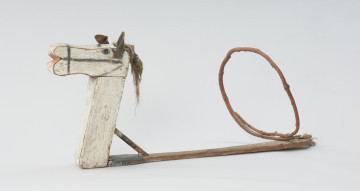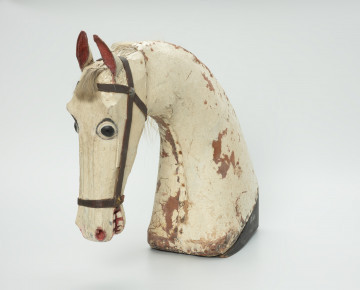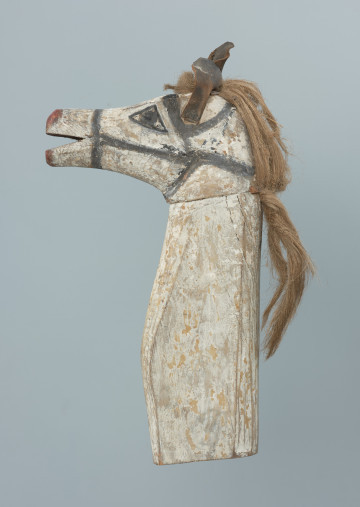
Hoarse - ceremonial item
1. połowa XX wieku
National Museum in Szczecin
Part of the collection: Material culture of West Pomerania
The rhythm of villagers’ life has always been determined by the seasons, as well as the customs and rituals closely connected to the changing nature throughout the year. During the winter, the practices focused on ensuring the return of the spring were most crucial. People believed that performing specific actions will guarantee that nature wakes from its winter dormancy and the earth produces crops they needed to survive. In Pomerania, as well as in many other regions, it was a common custom during the Christmas and carnival time for carol singers to visit homesteads. One of the characters most frequently played by the carolers was a boisterous and mischievous Turoń. The boy who played that creature was usually dressed in sheepskin or covered in cloth sheet and held a stick in its hand, topped with a monster’s head, with a long, distinctively snapping snout. At the crucial moment, Turoń would suddenly drop “dead” and then was brought back to life by one of its companions. On a magical level, the death of Turoń symbolised nature’s stagnation during winter, and its resurrection inspired hope in people that just like the creature, nature will be brought back to life. There are two costumes of Turoń in the ethnographic collection of the National Museum in Szczecin. Both come from the pre-war archives of the Pommersches Landesmuseum Stettin. The presented effigy was made around 1920. It is an amateur, unique product (maker unknown). The animal’s head and horns are made of wood, while the ears and the long tongue protruding from the string-moved jaw are made of leather. The palate and nostrils are painted red, while the rest of the creature is painted black. The Turoń has long fangs that add to its terrifying appearance.
Agnieszka Słowińska
Author / creator
Dimensions
cały obiekt: height: 10,5 cm, width: 41 cm
Creation time / dating
Creation / finding place
Identification number
Location / status

1. połowa XX wieku
National Museum in Szczecin

1. połowa XX wieku
National Museum in Szczecin

National Museum in Szczecin
DISCOVER this TOPIC
Castle Museum in Łańcut
DISCOVER this PATH
Educational path